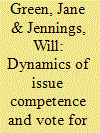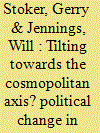|
|
|
Sort Order |
|
|
|
Items / Page
|
|
|
|
|
|
|
| Srl | Item |
| 1 |
ID:
149218


|
|
|
|
|
| Summary/Abstract |
A dynamic of global economic development means that many countries are experiencing uneven development and their citizens are increasingly split between those who can access high-skill jobs and those who cannot. As a result some citizens are living in cosmopolitan areas of growth and others in backwater areas of decline. There are emerging out of these processes two versions of England. In cosmopolitan areas we find an England that is global in outlook, liberal and more plural in its sense of identity. In provincial backwaters we find an England that is inward-looking, relatively illiberal, negative about the EU and immigration, nostalgic and more English in its identity. This bifurcation of England is already having political effects, reflected in the outcome of the 2015 general election. It will further reconfigure politics over the next two decades, creating diverse political citizens and a complex array of challenges and dilemmas for governments, political parties, campaigners and political organisers.
|
|
|
|
|
|
|
|
|
|
|
|
|
|
|
|
| 2 |
ID:
113138


|
|
|
|
|
| Publication |
2012.
|
| Summary/Abstract |
This article develops the reward-punishment issue model of voting using a newly collated aggregate measure of issue competence in Britain between 1971 and 1997, revealing systematic differences between governing and opposition parties in the way citizens' evaluations of party competence are related to vote intention. Using monthly Gallup 'best party to handle the most important problem' and vote intention data, time series Granger-causation tests give support to a classic issue reward-punishment model for incumbents. However, for opposition parties this reward-punishment model does not hold: macro-issue competence evaluations are Granger-caused by changes in vote choice or governing party competence. An explanation is offered based upon the differentiating role of policy performance and informational asymmetries, and the implications are considered for comparative studies of voting, public opinion and for political party competition.
|
|
|
|
|
|
|
|
|
|
|
|
|
|
|
|
| 3 |
ID:
103380


|
|
|
|
|
| Publication |
2011.
|
| Summary/Abstract |
Mega-events present a special venue for the practice of risk management. This article analyses the management of security risks in the case of two sporting mega-events, the London 2012 Olympic Games and the FIFA 2006 World Cup in Germany. To what extent do strategies and practices of risk management resemble each other across events? And what explains similarities or differences in the tools of risk management observed in each of these cases? First, this article explores three theoretical explanations for the choice of particular policy tools or instruments. Second, it introduces the tools of government approach as a means of conducting a direct comparative analysis of risk management across political and organizational settings and over time. The tools used for security risk management at the two mega-events are then compared and the different logics of tool choice are evaluated. This analytical approach offers a basis for future comparative inquiry into tools of risk management used in public and private organizations. The empirical findings highlight the particular importance of national political systems in influencing tool choice.
|
|
|
|
|
|
|
|
|
|
|
|
|
|
|
|
| 4 |
ID:
091076


|
|
|
|
|
| Publication |
2009.
|
| Summary/Abstract |
This article examines the responses of ministers facing high levels of blame in the press after serious failures in the public exam system for school-leavers in Scotland in 2000 and England in 2002. It develops a method for systematic analysis and comparison of the behaviour of officeholders facing blame, tests the hypothesis that ministers will accept personal culpability only after other ways of handling blame have been exhausted and uses time series intervention models to show how one can estimate the impact of strategies on the next day's blame level. The basic sequencing hypothesis is partially upheld by the observed behaviour in these cases, though many other kinds of blame responses do not display a clear sequence. The intervention analysis also raises questions about the claimed effectiveness of presentational strategies for managing blame.
|
|
|
|
|
|
|
|
|
|
|
|
|
|
|
|
| 5 |
ID:
155403


|
|
|
|
|
| Summary/Abstract |
The general election of June 2017 revealed a continued tilting of the political axis in England that has been long in the making. This was not a Brexit ‘realignment’—in that the vote is better seen as a symptom of a longer-term divide that is emerging between citizens residing in locations strongly connected to global growth and those who are not. In this analysis, we explore constituency-level patterns of voting in England between 2005 and 2017. Over this period, Labour's vote share has tended to rise in urban areas (that is, major cities), with younger and more diverse and more educated populations often working in ‘cosmopolitan’ industries, whereas the Conservative vote has tended to increase in less densely populated towns and rural areas, with older and less diverse populations. Significantly, Labour has also increased its vote in constituencies with a higher share of ‘precariat’ and emerging service workers—somewhat at odds with characterisation of a party that has lost the ‘left behind’. To the extent that changes in electoral support for the Conservatives and Labour are linked to the Brexit vote, the relationship far predates the referendum vote and should be expected to continue to reshape British politics in future.
|
|
|
|
|
|
|
|
|
|
|
|
|
|
|
|
|
|
|
|
|